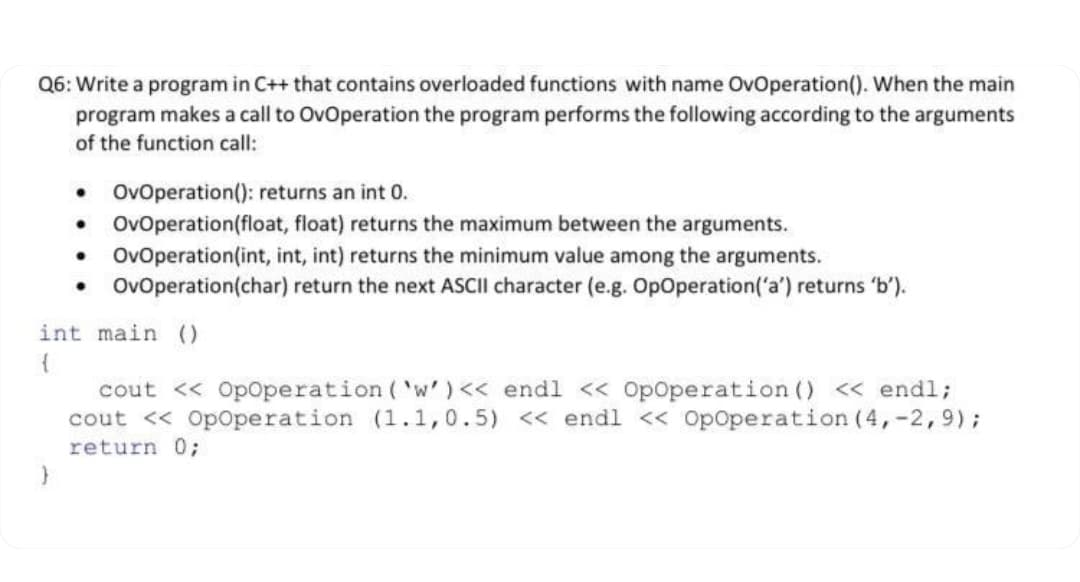Q6: Write a program in C++ that contains overloaded functions with name OvOperation(). When the main program makes a call to OvOperation the program performs the following according to the arguments of the function call: • OvOperation(): returns an int 0. • OvOperation(float, float) returns the maximum between the arguments. OvOperation(int, int, int) returns the minimum value among the arguments. OvOperation(char) return the next ASCII character (e.g. OpOperation('a') returns 'b').
Q6: Write a program in C++ that contains overloaded functions with name OvOperation(). When the main program makes a call to OvOperation the program performs the following according to the arguments of the function call: • OvOperation(): returns an int 0. • OvOperation(float, float) returns the maximum between the arguments. OvOperation(int, int, int) returns the minimum value among the arguments. OvOperation(char) return the next ASCII character (e.g. OpOperation('a') returns 'b').
Computer Networking: A Top-Down Approach (7th Edition)
7th Edition
ISBN:9780133594140
Author:James Kurose, Keith Ross
Publisher:James Kurose, Keith Ross
Chapter1: Computer Networks And The Internet
Section: Chapter Questions
Problem R1RQ: What is the difference between a host and an end system? List several different types of end...
Related questions
Question

Transcribed Image Text:Q6: Write a program in C++ that contains overloaded functions with name OvOperation(). When the main
program makes a call to OvOperation the program performs the following according to the arguments
of the function call:
• OvOperation(): returns an int 0.
• OvOperation(float, float) returns the maximum between the arguments.
• OvOperation(int, int, int) returns the minimum value among the arguments.
OvOperation(char) return the next ASCII character (e.g. OpOperation('a') returns 'b').
int main ()
cout << Opoperation ( 'w' )<< endl << Opoperation () « endl;
cout << OpOperation (1.1,0.5) << endl << Opoperation (4,-2,9);
return 0;
Expert Solution
This question has been solved!
Explore an expertly crafted, step-by-step solution for a thorough understanding of key concepts.
Step by step
Solved in 3 steps with 2 images

Recommended textbooks for you

Computer Networking: A Top-Down Approach (7th Edi…
Computer Engineering
ISBN:
9780133594140
Author:
James Kurose, Keith Ross
Publisher:
PEARSON

Computer Organization and Design MIPS Edition, Fi…
Computer Engineering
ISBN:
9780124077263
Author:
David A. Patterson, John L. Hennessy
Publisher:
Elsevier Science

Network+ Guide to Networks (MindTap Course List)
Computer Engineering
ISBN:
9781337569330
Author:
Jill West, Tamara Dean, Jean Andrews
Publisher:
Cengage Learning

Computer Networking: A Top-Down Approach (7th Edi…
Computer Engineering
ISBN:
9780133594140
Author:
James Kurose, Keith Ross
Publisher:
PEARSON

Computer Organization and Design MIPS Edition, Fi…
Computer Engineering
ISBN:
9780124077263
Author:
David A. Patterson, John L. Hennessy
Publisher:
Elsevier Science

Network+ Guide to Networks (MindTap Course List)
Computer Engineering
ISBN:
9781337569330
Author:
Jill West, Tamara Dean, Jean Andrews
Publisher:
Cengage Learning

Concepts of Database Management
Computer Engineering
ISBN:
9781337093422
Author:
Joy L. Starks, Philip J. Pratt, Mary Z. Last
Publisher:
Cengage Learning

Prelude to Programming
Computer Engineering
ISBN:
9780133750423
Author:
VENIT, Stewart
Publisher:
Pearson Education

Sc Business Data Communications and Networking, T…
Computer Engineering
ISBN:
9781119368830
Author:
FITZGERALD
Publisher:
WILEY